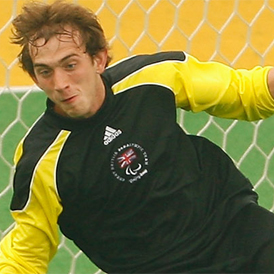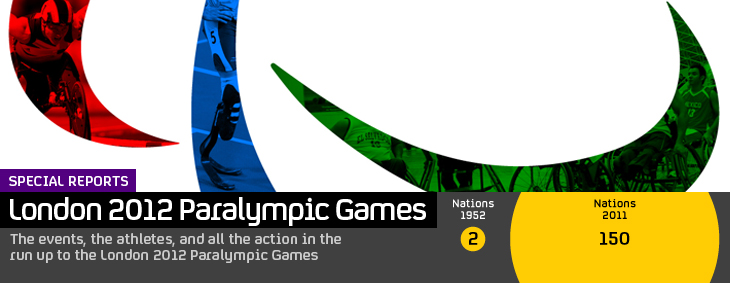Paralympic footballers were ‘naive’ about sport
As the event schedule for the London 2012 Paralympics is released, Channel 4 News speaks to footballers who admit they were “naive” and “sceptical” about disability football until they got involved.
- Chapters
- descriptions off, selected
- subtitles off, selected
- captions settings, opens captions settings dialog
- captions off, selected
This is a modal window.
This is a modal window. This modal can be closed by pressing the Escape key or activating the close button.
Everyone training for the London Paralympics has an inspiring tale to tell: some of the athletes were born without limbs, others were wounded fighting in Iraq or Afghanistan.
The Paralympics GB team for 2012 will consist of around 300 athletes in up to 20 sports from boccia to basketball.
Now the event schedule has been released the sportsmen and women know when they will be competing.
Among the hopefuls for 2012 is Michael Barker – a footballer from Liverpool.
He had trials for Everton as a teenager before, at the age of 15, he was run over by a bus and left with a fractured skull and “battered body”.
Michael faced months of rehabilitation and it was during this time he was approached to play disability football: “At first I was a bit sceptical and was like ‘I’m not disabled.'”
But when he eventually started training, Michael realised the standard was higher than he had previously played.
I had the stereotype view of disability football, a bit of a token gesture and I couldn’t have been more wrong. Jordan Raynes
Michael is in the seven-a-side football squad ahead of London 2012. The players all have cerebral palsy or a brain injury which affects their mobility.
The seven-a-side football takes place every other day from 1 September 2012 until the final on 9 September.
Russia and Ukraine are the top sides in the world but Michael says the British team is the “best it’s been in ages”.
Any mention of London 2012 and the 24-year-old lights up: “It’s nerve-wracking it’s exciting, I’m just dead agitated about it.”
He has had plenty of time to dream about the outcome: “We’re in the final with 59 minutes on the clock … it’s 3-3 and then I score in the 59th minute and run to the crowd. That would do me. That would be amazing.”
Read more from Channel 4 about the Paralympics

‘I was very naive’
Goalkeeper Jordan Raynes is team captain. He is 21 and despite having cerebral palsy grew up playing able-bodied football with his brothers who are now professionals.
Jordan started playing disability football when he was 14: “I think I was very naive in terms of what I expected disability football to be although now I’m very proud to be a part of it.
“I had the stereotype view of what it was, a bit of a token gesture, and it turns out I couldn’t have been more wrong.”
He added: “I met people similar to myself …it made me a better footballer and also comfortable in my own body because I met people with my disability with common interests and it made me so much more comfortable and confident in myself as a person and an athlete.
Jordan said people who have never seen it would “definitely” be shocked by how high the standard is.
“London 2012 seems to be everywhere at the moment and it’s growing and every time you see it on TV or in the newspaper it sends tingles down your spine.”
